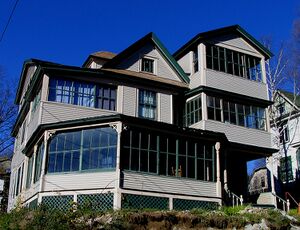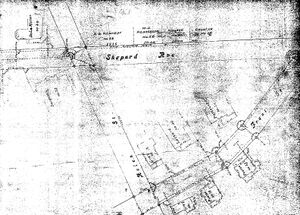Helen Hill

Noyes Cottage| ]] Helen Hill lies between Church and Pine Streets, south of Main Street. Helen Street, the main connection to the village center, climbs the hill from Church Street, crossing Front Street, Shepard Avenue and Franklin Avenue, which have each climbed the hill from the south. Looping Clinton Avenue, and little Fawn Street and Prescott Place (formerly Park Place) complete the compact area's streets; together they held the greatest concentration of cure cottages in Saranac Lake.
In total, the neighborhood consists of these streets:
- Helen Street
- Front Street
- Shepard Avenue
- Franklin Avenue
- Clinton Avenue
- Fawn Street
- Prescott Place (formerly Park Place)
- a portion of Pine Street
In 1892, the area was developed by Lake Placid attorney Frederick A. Isham on twenty-one acres that he owned with the Blood family; it was the first large development in the village. The land had originally been owned by Orlando Blood, Jacob Smith Moody. Prior to the development, the land was a sheep pasture, conveniently free of trees. It was surveyed by George T. Chellis into 174 lots that the developers termed "Villa Sites", despite an average size of just over a tenth of an acre.
The lots sold quickly. Some homes were built on two or three adjoining lots. Among the prominent citizens building homes on the hill were architect William L. Coulter, philanthropist Mary R. Prescott, department store owner William C. Leonard, attorney Addis K. Botsford, and Canadian rubber magnate D. Lorne McGibbon. Over time, most of the residences were converted to commercial private sanitoria.
Helen Hill first appears on the Sanborn Maps in 1908.

Blood Hill|, from Park Place| at left to Franklin Manor| at right, 1902 (Library of Congress) ]]

Blood Hill|, from near Park Place| at left to Franklin Manor| at right, c. 1909 (Library of Congress) ]]

Mary Hotaling|. ]]
See also
Source
Gallos, Philip L., Cure Cottages of Saranac Lake, Historic Saranac Lake, 1985, pp 47-48. ISBN 0-9615159-0-2 .